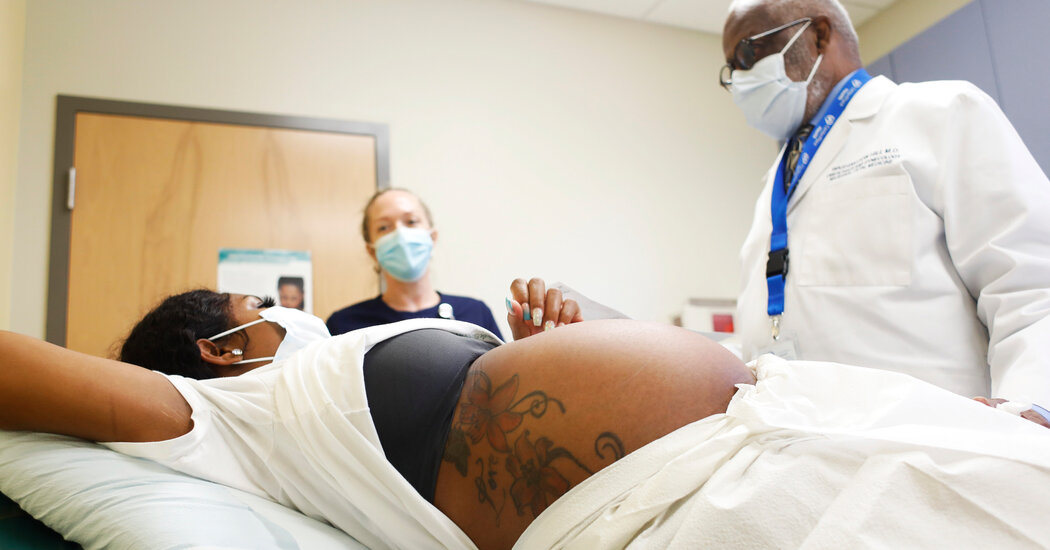The Latest
Maternal diabetes, a pregnancy complication that can affect up to a third of women globally, is linked with a higher risk of neurodevelopmental issues in children, a large new study found.
The study, which was published in the journal Lancet Diabetes & Endocrinology on Monday, adds to a growing body of evidence that ties maternal diabetes to a range of health complications for both the mother and the child. Though the findings describe only a correlation, experts said the data underscored the need for screening and early treatment of diabetes, a condition that is becoming more common worldwide.
In the United States, an estimated 10 percent of women had diagnosed diabetes in 2021, and 9 percent of pregnant American women develop gestational diabetes every year.
“We’ve known for some time that there’s some link between elevated glucose levels in pregnancy and future neurodevelopmental disorders,” said Dr. Elizabeth Halprin, who is chief of adult diabetes at the Joslin Diabetes Center in Boston and was not involved in the study. The new findings speak “to the need to control diabetes during pregnancy,” she added.
The Research
The analysis, which pooled data from 202 studies on more than 56 million pregnancies around the world, examined outcomes for children whose mothers had Type 1 or Type 2 diabetes while pregnant, or were diagnosed with gestational diabetes. These conditions are collectively referred to as “maternal diabetes.”
Even when studies accounted for other factors like a woman’s age or body mass index, children born to women who had diabetes during pregnancy were 28 percent more likely to have a neurodevelopmental issue than children whose mothers didn’t have the disease. The risks of A.D.H.D. and intellectual disability were slightly higher compared with those of other issues, like autism.
The analysis found a greater likelihood of neurodevelopmental disorders in children of women who were diabetic before pregnancy, compared with those who had gestational diabetes.
Having gestational diabetes for a longer period of time or having gestational diabetes severe enough to warrant medication also increased the risk.
The consistency of the associations is surprising, given how large and diverse the data set was, said Fangkun Liu, an author of the paper and an associate professor of neurosurgery at Central South University in Changsha, China.
It’s not clear what might be behind the potential link between high blood sugar levels and neurodevelopmental issues. The study’s authors suggest that Type 1 diabetes, an autoimmune condition, may increase inflammation in children, correlating with increased risk of autism and ADHD. Maternal diabetes also affects how genes are expressed and could cause changes that affect brain function, they said.
Doctors have also known for years that high blood sugar increases the risk of neurological birth defects, including spina bifida and a condition called anencephaly, when the brain isn’t fully developed. It therefore isn’t surprising that high blood sugar might affect other types of neurological development, too, said Dr. Susan Spratt, a professor of endocrinology at the Duke University School of Medicine.
The Limitations
The study “does not establish diabetes as a direct cause” of neurodevelopmental disorders, Dr. Liu said, because it was difficult to account for all confounding factors, particularly genetics. Some studies in the analysis looked at siblings and found no clear link between maternal diabetes and neurodevelopmental issues.
Both Dr. Halprin and the authors noted that the new study didn’t include much data from low-income countries, such as those in South and Southeast Asia, where maternal diabetes is more prevalent.
What’s Next
The biggest unanswered question is whether getting blood sugar under control could cut these potential risks.
“As a researcher, a physician in this space, as well as a parent, I really want to now know more about the impact of glucose control treatment in pregnancy,” said Dr. Kartik Venkatesh, who is the director of the Diabetes in Pregnancy Program at Ohio State University and was not involved in the study. The authors called for more rigorous research into this question.
Several experts said the study points to the need for comprehensive diabetes screening among young women in their 20s and 30s, so that anyone who may get pregnant receives treatment before they conceive. An estimated 4 percent of U.S. women had undiagnosed diabetes in 2021.
The American Diabetes Association recommends that women with diabetes meet with an endocrinologist or a specialist in maternal-fetal medicine when planning to conceive. In addition to controlling their blood sugar before and during pregnancy, some patients may need to stop taking certain drugs, such as medications called sulfonylureas, which are known to cross the placenta and are typically not recommended during pregnancy. There is little research on the effects of drugs like Ozempic during pregnancy.
The A.D.A. recommends that pregnant patients with diabetes receive nutrition counseling that promotes a diet of whole grains, lean protein and fresh fruits and vegetables. Exercise can help improve glucose levels and reduce the need for insulin, which is the preferred medication for managing diabetes in pregnancy.
While the findings can seem concerning, Dr. Venkatesh said, “the reality of diabetes care in pregnancy is we have treatments that work.”




